Daniel Jordan Smith is associate professor in and chair of the Anthropology Department at Brown University. He is the author of Culture of Corruption: Everyday Deception and Popular Discontent in Nigeria and the coauthor of The Secret: Love, Marriage, and HIV.
The University of Chicago Press, Chicago 60637
The University of Chicago Press, Ltd., London
2014 by The University of Chicago
All rights reserved. Published 2014.
Printed in the United States of America
23 22 21 20 19 18 17 16 15 14 1 2 3 4 5
ISBN-13: 978-0-226-10866-7 (cloth)
ISBN-13: 978-0-226-10883-4 (paper)
ISBN-13: 978-0-226-10897-1 (e-book)
DOI: 10.7208/chicago/9780226108971.001.0001
Library of Congress Cataloging-in-Publication Data
Smith, Daniel Jordan, 1961 author.
AIDS doesnt show its face: inequality, morality, and social change in Nigeria / Daniel Jordan Smith.
pages; cm
Includes bibliographical references and index.
ISBN 978-0-226-10866-7 (cloth: alkaline paper) ISBN 978-0-226-10883-4 (paperback: alkaline paper) ISBN 978-0-226-10897-1 (e-book) 1. AIDS (Disease)Moral and ethicalaspectsNigeria. 2. AIDS (Disease)Social aspectsNigeria. 3. NigeriaSocial conditions1960 4. Social changeNigeria21st century. I. Title.
RA643.86.N6S558 2014
362.19697'92009669dc23
2013023573

This paper meets the requirements of ANSI/NISO Z39.48-1992 (Permanence of Paper).
INTRODUCTION
As passengers and their belongings were loaded, the bus conductor recruited other travelers, shouting his destination, Umuahia! Umuahia! and adding in the local Igbo language: Leaving just now. But the bus would not leave until it was packed tight, with four people squeezed into each row of seats designed to hold three and an improbably large load tied to the roof. The minibuses that run between Aba and Umuahia are crowded and hot, and this particular July afternoon was no exception. As a young man worked to secure the precariously balanced cargo of luggage, live animals, and all manner of goodsmany of the passengers were traders from Umuahia who came to refurbish their stocksthere was plenty of time to buy plastic sachets of cold water, boiled groundnuts, fried yams, and scores of other snacks and knickknacks sold by busy hawkers, many of them children, carrying their livelihoods on their heads.
When the bus was finally loaded, the driver appeared for the first time and we set out on the short journey to Umuahiaabout an hour, assuming no tire punctures, mechanical troubles, or long searches by the police. As the bus left the park, a young man stood up (to the extent that it was possible to do so in the cramped bus) to ask that we pray for journey mercies. Southeastern Nigeria is a heavily Christian region. The local Igbo-speaking people are the third largest ethnic group in Nigerias mosaic of more than 300 tribes and more than 160 million people. They are also increasingly likely to be Pentecostal, evangelical, or, as they commonly say in Nigeria, born again. So I was not surprised when, after leading the prayer, this young man continued to preach the word of God.
Evangelists commonly proselytize on Nigerian buses. Passengers are, after all, a captive audience. Occasionally, Id seen travelers rebel and force one of these peripatetic pastors-in-the-making to sit down and cease evangelizing, but usually Igbos listen politelyand even enthusiastically, if the preacher is good. This young man was good, very good. He spoke with passion and charisma, and he connected his biblical stories to examples from everyday life in Nigeria. He had the whole group enthralled, with passengers shouting, Amen! Hallelujah! Eziokwu! (Igbo for you speak truth), and Praise the Lord! at exactly the right moments to punctuate his lively oration.
The young evangelist spoke about bad leaders, corruption, and the ways that ordinary Nigerians suffer in a land of plenty. Like so many of the countrys most successful Pentecostal pastors, he tapped into Nigerians ambivalence about the consequences of social change. On the one hand, he promised prosperity and health to those who follow Christ, acknowledging and drawing on peoples aspirations for wealth, consumer commodities, and modern lifestyles. On the other hand, he railed against greed, crime, and wanton sexual behaviorsocial ills perceived to be sweeping Nigerias cities and towns and placing in peril not only a new generation of Nigerians, but the future of the country as a whole. I had heard Pentecostal preachers make such critiques many times, and ordinary citizens talked about these issues every day. But this man preached with uncommon passion, a filmmakers eye for detail, and a social scientists penchant for encompassing explanation. No wonder his fellow passengers found his message exciting.
At the time, I was conducting research on social aspects of Nigerias AIDS epidemic, focusing specifically on marriage, masculinity, and mens extramarital sexual behavior. I had become fascinated and concerned by the degree to which many Nigerians conceived of the nations AIDS problem as a symptom and a product of a collective moral crisis. So when this man began to talk about AIDS, I was even more intrigued. Given his ruminations on other social problems in Nigeria, I expected him to have something noteworthy to say. He did not disappoint.
Id heard many preachersand ordinary Nigeriansexplain AIDS as the consequence of the failure of modern morality, citing often-repeated platitudes about fornication, adultery, promiscuity, and the demise of Christian values in the face of greed, unbridled desire, and insincerity. Instead, this preacher told a story. He narrated the account of a young woman from his village. She had contracted HIV after migrating to the city in search of work. Although it was parable of sorts, mostly aimed to show the consequences of sin, the man told the story in a way that also evoked sympathy for the girl. She had been lured into a sexual relationship by an older married manand by the devilbecause she needed money to pay her rent and she wanted to be able to dress in nicer clothes like other migrant girls she had met in the city. She also felt pressure to help her parents pay the school fees for her younger siblings back home in the village.
Unlike many of the messages about AIDS in Nigeria that attribute an individuals HIV infection to sin and that blame the national epidemic on a country-wide moral crisisthereby obfuscating the social, political, and economic underpinnings of the diseasethis mans story connected sin to the realities of difficult lives and attributed the failures of societal morality to systematic inequality. I am not sure whether his story was heard in this way by my fellow passengers on the sweaty bus ride from Aba to Umuahia. Perhaps I deduced more sympathy for the girl and more of a political critique than he intended. Indeed, like so much of what I have heard about AIDS in Nigeria, his message emphasized the moral underpinnings of Nigerias current problems. But his words also nurtured a growing sense I had that examining the relationship between inequality and morality was crucial for understanding peoples experiences with the disease and for analyzing its consequences for society. Further, the bus preachers anecdote about the girl from his village was yet one more example of the way popular responses to AIDS in Nigeria seem to be about more than just health and disease: they provide a window onto peoples aspirations, experiences, and ambivalences regarding a host of social changes. These changes range from urbanization and the fitful penetration of capitalism to the spread of desires for modern consumption and new configurations in the social organization of communities and families. All of these transformations are bound up with peoples perceptions of rising levels of inequality. Yet among the people in southeastern Nigeria I have studied, the causes and consequences of these changes are most commonly discussed and explained in moral terms.


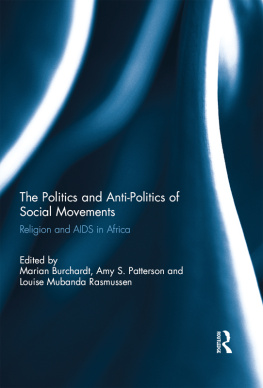
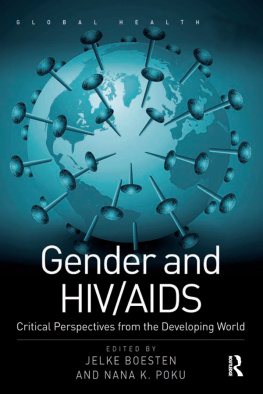
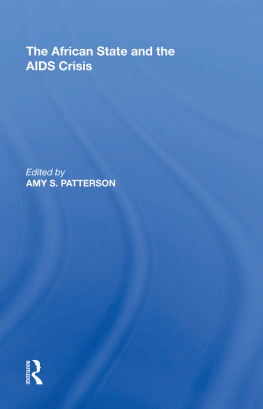
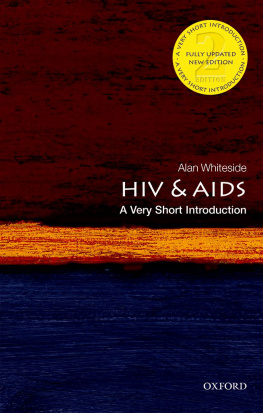
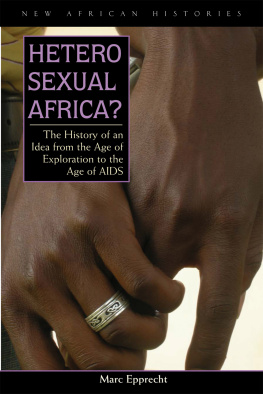
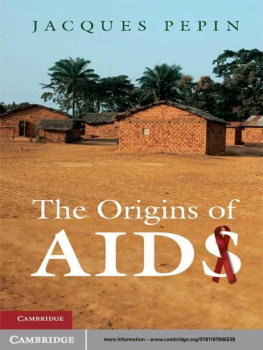
 This paper meets the requirements of ANSI/NISO Z39.48-1992 (Permanence of Paper).
This paper meets the requirements of ANSI/NISO Z39.48-1992 (Permanence of Paper).